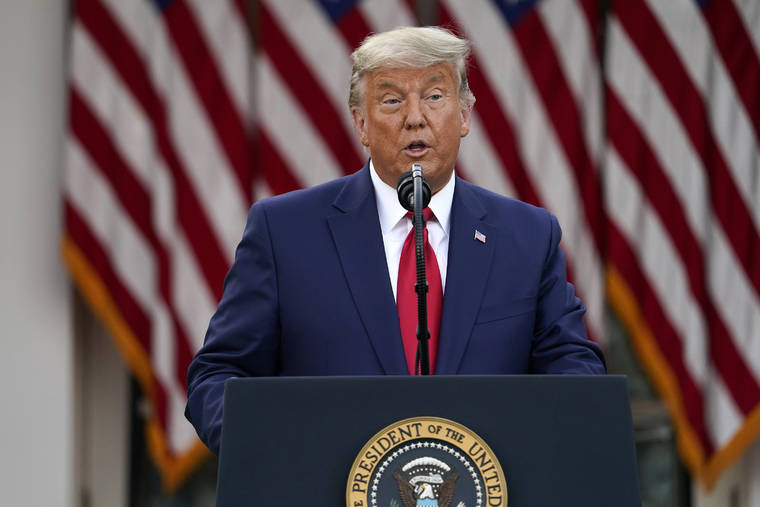WASHINGTON — President Donald Trump on Friday wrongly claimed full credit for Pfizer Inc.’s announcement that its COVID-19 vaccine was robustly successful and suggested without evidence that a separate state review will cause a protracted delay for New York residents waiting for a vaccine.
A look at the statements, made during his first public remarks since his defeat by President-elect Joe Biden:
Pfizer and Operation Warp Speed
TRUMP: “As a result of Operation Warp Speed, Pfizer announced on Monday that its China virus vaccine was more than 90% effective. …Pfizer said it wasn’t part of Warp Speed, but that turned out to be an unfortunate misrepresentation.”
THE FACTS: Not so much. Pfizer notably did not accept government money to develop, test or expand manufacturing capacity under Trump’s Operation Warp Speed initiative to quickly find a vaccine and treatments for the disease sweeping the country.
In fact, Pfizer partnered with the vaccine’s original developer, Germany’s BioNTech, in March and the following month announced the first human study in Germany. The White House announced Operation Warp Speed in May.
Pfizer opted not to join Operation Warp Speed initially but is following the same general requirements for the vaccine’s development as competitors who received government research money. The company says it has risked $2 billion of its own money on vaccine development and won’t get anything from Washington unless the effort is successful.
“Pfizer’s COVID-19 vaccine development and manufacturing costs have been entirely self-funded,” Pfizer spokeswoman Jerica Pitts said this week. “We decided to self-fund our efforts so we could move as fast as possible.”
However, Pfizer did sign an agreement with the U.S. government in July worth $1.95 billion — if the vaccine pans out and is cleared by the FDA — to supply 100 million doses. That guarantees Pfizer a U.S. market, an important incentive.
The supply side of Operation Warp Speed also allows Pfizer logistical help, although the company will directly ship its own vaccine, while the government will control shipping of other COVID-19 vaccines.
Pfizer’s announcement does not mean a vaccine has been approved and will immediately hit the market.
The next step for Pfizer would be to apply for “emergency use authorization” by the Food and Drug Administration, probably later this month, which would allow for limited distribution before it seeks full FDA approval for wider use by the general public in 2021. Neither step is guaranteed to happen.
New York delay
TRUMP: “The vaccine will be available to the entire general population with the exception of places like New York state where for political reasons the governor decided to say — and I don’t think it’s good politically, I think it’s very bad from a health standpoint — but he wants to take his time with a vaccine. …We can’t be delivering it to a state that won’t be giving it to its people immediately.”
THE FACTS: That’s a misrepresentation. New York’s separate review doesn’t guarantee a protracted delay.
Trump is referring to a state panel of experts that New York Gov. Andrew Cuomo announced in September to review any coronavirus vaccine authorized by the Food and Drug Administration before it is to be distributed in the state.
That additional review doesn’t necessarily mean weeks of delay before New York residents can get a federally approved vaccine. As a practical matter, the FDA will have a public meeting where its independent advisers debate the data, an opportunity for any interested group to get an early look.
Cuomo, speaking Friday on CNN, said that as soon as the FDA acts, the state review group would, too.
“There will be no delay,” he said.
There is some uncertainty around how the state-level reviews will ultimately work. Cuomo said the only issue could be if the review group in New York or one of the other states doing reviews finds a problem. But he notes that: “I don’t think the FDA is going to play any games at this point.”
A handful of other states, including California, have said they would conduct separate safety reviews.
California’s plan is to review data quickly so there is no delay in distribution, said Dr. Arthur Reingold, the group’s chair. He said the state’s review group — which has been joined by Nevada, Oregon and Washington — has confidence in the federal review process, but that its work is intended to provide additional reassurance to people.
“Any assertion that our citizens will be delayed in receiving a safe and effective COVID vaccine is simply not borne out by the plans we have in place,” said Reingold, a professor of epidemiology at the University of California, Berkeley.






